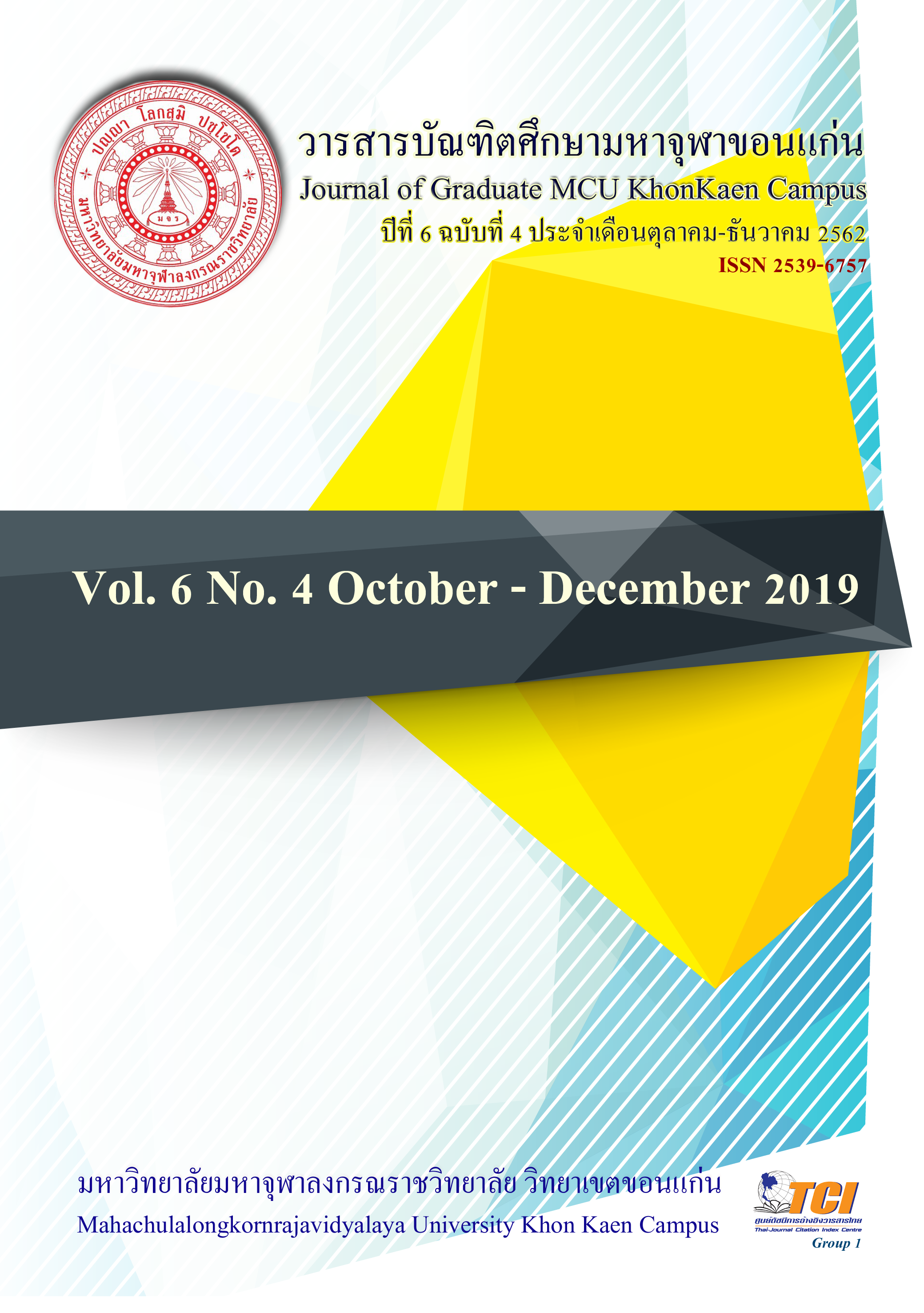การส่งเสริมพฤติกรรมที่พึงประสงค์ของคนในครอบครัว ด้วยการรักษาอุโบสถศีลของชุมชนชาวพุทธ ในเขตเทศบาลนครขอนแก่น
Main Article Content
บทคัดย่อ
การวิจัยในครั้งนี้มีวัตถุประสงค์ 3 ข้อ คือ 1. เพื่อศึกษาพฤติกรรมการอยู่ร่วมกันของครอบครัวชุมชนชาวพุทธในเทศบาลนครขอนแก่น 2. เพื่อส่งเสริมการอยู่ร่วมกันของครอบครัวชุมชนชาวพุทธในเทศบาลนครขอนแก่นด้วยการรักษาอุโบสถศีล 3. เพื่อเสนอพฤติกรรมการอยู่ร่วมกันที่พึงประสงค์ของชุมชนชาวพุทธในเทศบาลนครขอนแก่นด้วยการรักษาอุโบสถศีล เป็นการวิจัยเชิงคุณภาพ ผู้วิจัยกำหนดลงภาคสนามที่ชุมชนชาวพุทธในเขตเทศบาลนครขอนแก่น 5 ชุมชน ได้แก่ ชุมชนวัดธาตุ ชุมชนวัดหนองแวง ชุมชนวัดโพธิ์โนนทัน ชุมชนวัดวุฒาราม และชุมชนวัดศรีนวล กลุ่มเป้าหมาย คือ ผู้ที่เกี่ยวข้องกับผู้รักษาอุโบสถศีล จำนวน 60 คน การได้มาโดยวิธีเจาะจง (Purposive sampling) ทำการเก็บข้อมูลภาคสนาม โดยการใช้การสัมภาษณ์แบบมีโครงสร้าง และทำการวิเคราะห์ข้อมูลที่ได้มา
ผลการวิจัยพบว่า
1) กลุ่มผู้รักษาอุโบสถศีลในเทศบาลนครขอนแก่น โดยมากเป็นผู้สูงอายุ ปัญหากระทบกระทั่งระหว่างสมาชิกในครอบครัวอยู่บ้างแต่ไม่มากนัก เมื่อพบปัญหาก็พยายามแก้ไขปัญหาตามหลักพุทธวิธี
2) ชุมชนชาวพุทธในเทศบาลนครขอนแก่นส่งเสริมผู้รักษาอุโบสถศีลด้วยดี กล่าวคือคนในครอบครัวอำนวยความสะดวกกลุ่มผู้รักษาอุโบสถศีล ส่วนทางวัดก็จัดกิจกรรม เช่น สวดมนต์ แผ่เมตตา นั่งสมาธิ เดินจงกรม ฟังเทศน์แก่กลุ่มผู้รักษาอุโบสถศีล ทำให้เกิดความสุข จิตใจสงบ อารมณ์เบิกบานมีผลดีต่อผู้ปฏิบัติและคนรอบข้าง
3) พฤติกรรมที่พึงประสงค์ สามารถปรับได้ด้วยอุโบสถศีล ทำให้มีพฤติกรรมทางกายสุภาพอ่อนน้อม สำรวม พูดสุภาพ พูดคำสัตย์ น่าเชื่อถือ ด้านใจหรืออารมณ์นั้นมีความเบิกบานไม่เครียด มองโลกอย่างรู้เท่าทันไม่ยึดติด จนยึดถืออะไร เป็นของตัวเอง รู้จักปล่อยวาง เข้าสังคมได้อย่างองอาจกล้าหาญ เพราะมีศีลเป็นแบบอย่างที่ดีของคนในครอบครัวและสังคม
Article Details

อนุญาตภายใต้เงื่อนไข Creative Commons Attribution-NonCommercial-NoDerivatives 4.0 International License.
เอกสารอ้างอิง
Phra Dhammapidok (Por Payutto) 2003. Tell the story to Jam. Bangkok: Mahachulalongkornrajavidyalaya University.
Phra Maha Thanapat Thitsaro (Si Han Nam). 2008. "An Analytical Study of the Effects of Preservation of the Buddhist Chapel of the Non Muang People on the Quality of Life Development". Master of Buddhist Thesis. Graduate School: Mahachulalongkornrajavidyalaya University.
Phra Phaya Ya Nantaphikhu 2001. People who observe the precepts, precepts and observe people. Bangkok: Amy Partnership.
Phra Ubon Kumpunyo (Kaewwong Lom). 1994. "An Analytical Study of the Value of Precepts to Thai Society". Master of Thesis. Graduate School: Mahachulalongkornrajavidyalaya University.
Phrakhusamhu Krittaphat sukijjo (Chotikarn). 2017. "Studying the treatment of the Buddhist chapel of women appearing in the Dhammapada Commentary". Master of Science Thesis Buddhism Program Graduate School: Mahachulalongkornrajavidyalaya University.
Thanit Yo Pho. Virtue of Ubosot. 1994. 4th edition. Bangkok: Siwaphon Printing.

